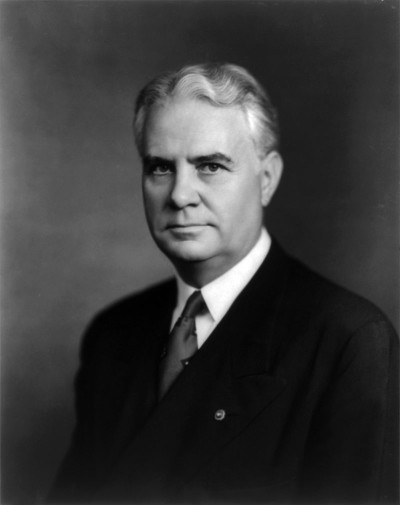John Bricker (John William Bricker)

During World War I, John Bricker served as first lieutenant and chaplain in the United States Army in 1917 and 1918. He was subsequently the solicitor for Grandview Heights, Ohio, from 1920 to 1928, assistant Attorney General of Ohio from 1923 to 1927, a member of the Public Utilities Commission of Ohio from 1929 to 1932, and Attorney General of Ohio from 1933 to 1937. He was elected governor for three two-year terms, serving from 1939 to 1945, having each time won with a greater margin of victory. John Bricker was the 1944 Republican nominee for vice president, having run with presidential nominee Thomas E. Dewey, the governor of New York who was nine years Bricker’s junior. The Republicans lost handily to the Democratic ticket of Franklin D. Roosevelt and Harry S. Truman. In that campaign, Bricker proved to be a tireless campaigner. He visited thirty-one states and made 173 speeches, including 28 over a six-day period. His final remarks came on radio on election eve from the governor’s office in Columbus, when he declared: “Not only has the New Deal depleted our resources, recklessly spent our money, but it has undermined the very spiritual foundations of our government.” Though most of his campaigning was in New England, the Middle West, and the American West, Bricker even visited the then-historically and -heavily Democratic state of Texas, where in Dallas, he called Franklin Roosevelt “a front for the Hillman-Browder Communist Party,” referring to the respective leaders of the Congress of Industrial Organizations labor union and the Communist Party of the United States of America political party.
In 1946, John Bricker was elected to the United States Senate. He was re-elected in 1952, serving from January 3, 1947, to January 3, 1959. Governor Dewey was the Republican presidential nominee again in 1948, but Senator Bricker was not his running mate. Dewey chose instead Governor Earl Warren of California in the hope that the 1948 ticket would carry California, which the Dewey-Bricker ticket had failed to do. The Dewey-Warren ticket also lost California, and the absence of Bricker on the second ticket may have been a factor in Dewey’s failure to win Bricker’s home state of Ohio again.[citation needed] Bricker had campaigned with Warren in 1944 in Sacramento, where Bricker attacked the politics of war-time rationing; then in San Francisco Bricker charged that Roosevelt had packed the U.S. judiciary with liberal jurists hostile to the Constitution. However, even if Dewey had carried both California and Ohio in 1948, the two large states would have been insufficient to make him President in that second campaign. Bricker’s Senate service is best remembered for his attempts to amend the United States Constitution to limit the President’s treaty-making powers (the Bricker Amendment). He was the chairman of the Committee on Interstate and Foreign Commerce during the 83rd Congress.
On July 12, 1947, a former Capitol police officer fired shots at Senator Bricker as he boarded the underground trolley from the Senate office building to the Capitol. The two shots, fired as close range, narrowly missed the target. In 1958, Stephen M. Young ran for the Senate against the incumbent Bricker. Bricker seemed invincible, but Young capitalized on widespread public opposition to the proposed “right to work” amendment to Ohio’s constitution, which Bricker had endorsed. Few thought that Young, 70 at the time, could win; even members of his own party had doubts, particularly Ohio’s other senator, Democrat Frank J. Lausche. In an upset amid a national Democratic trend, Young defeated Bricker by 52 to 48 percent. Bricker then retired from public life. After leaving the Senate, John Bricker resumed the practice of law. He died in Columbus on March 22, 1986 at the age of ninety-two and is interred there at Green Lawn Cemetery.
Born
- September, 06, 1893
- USA
- Mount Sterling, Ohio
Died
- March, 22, 1986
- USA
- Columbus, Ohio
Cemetery
- Green Lawn Cemetery
- Columbus, Ohio
- USA



